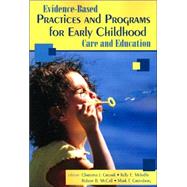
Note: Supplemental materials are not guaranteed with Rental or Used book purchases.
Purchase Benefits
What is included with this book?
| Acknowledgments | ix | ||||
| About the Editors | xi | ||||
| About the Contributors | xv | ||||
| Introduction | xix | ||||
| A Growing Interest in Early Childhood Care and Education | xix | ||||
| How This Book Can Help | xx | ||||
| Risk and Protective Factors | xxi | ||||
| Levels of Evidence Regarding Programs and Best Practices | xxii | ||||
| References | xxiii | ||||
|
|||||
|
3 | (22) | |||
|
|||||
|
|||||
|
3 | (1) | |||
|
4 | (6) | |||
|
10 | (1) | |||
|
10 | (7) | |||
|
17 | (2) | |||
|
19 | (1) | |||
|
20 | (1) | |||
|
21 | (4) | |||
|
25 | (31) | |||
|
|||||
|
|||||
|
26 | (3) | |||
|
29 | (3) | |||
|
32 | (7) | |||
|
39 | (5) | |||
|
44 | (5) | |||
|
49 | (7) | |||
|
56 | (11) | |||
|
|||||
|
|||||
|
58 | (1) | |||
|
59 | (3) | |||
|
62 | (1) | |||
|
62 | (5) | |||
|
|||||
|
67 | (21) | |||
|
|||||
|
68 | (5) | |||
|
73 | (9) | |||
|
82 | (2) | |||
|
84 | (1) | |||
|
85 | (3) | |||
|
88 | (14) | |||
|
|||||
|
|||||
|
89 | (3) | |||
|
92 | (4) | |||
|
96 | (2) | |||
|
98 | (2) | |||
|
100 | (2) | |||
|
102 | (12) | |||
|
|||||
|
|||||
|
102 | (1) | |||
|
103 | (2) | |||
|
105 | (1) | |||
|
105 | (4) | |||
|
109 | (1) | |||
|
109 | (1) | |||
|
110 | (2) | |||
|
112 | (2) | |||
|
114 | (21) | |||
|
|||||
|
|||||
|
115 | (1) | |||
|
116 | (13) | |||
|
129 | (1) | |||
|
130 | (1) | |||
|
131 | (4) | |||
|
135 | (24) | |||
|
|||||
|
136 | (1) | |||
|
137 | (5) | |||
|
142 | (1) | |||
|
143 | (1) | |||
|
144 | (1) | |||
|
145 | (1) | |||
|
146 | (1) | |||
|
146 | (3) | |||
|
149 | (1) | |||
|
150 | (2) | |||
|
152 | (7) | |||
|
|||||
|
159 | (22) | |||
|
|||||
|
|||||
|
160 | (1) | |||
|
161 | (5) | |||
|
166 | (3) | |||
|
169 | (4) | |||
|
173 | (1) | |||
|
174 | (2) | |||
|
176 | (1) | |||
|
177 | (1) | |||
|
177 | (4) | |||
| Index | 181 |
The New copy of this book will include any supplemental materials advertised. Please check the title of the book to determine if it should include any access cards, study guides, lab manuals, CDs, etc.
The Used, Rental and eBook copies of this book are not guaranteed to include any supplemental materials. Typically, only the book itself is included. This is true even if the title states it includes any access cards, study guides, lab manuals, CDs, etc.